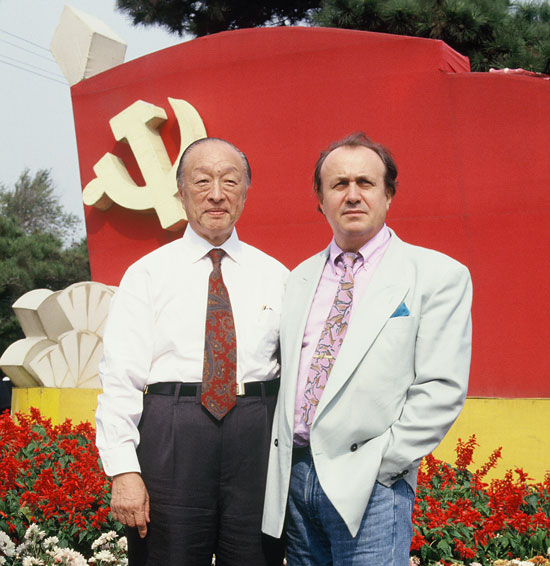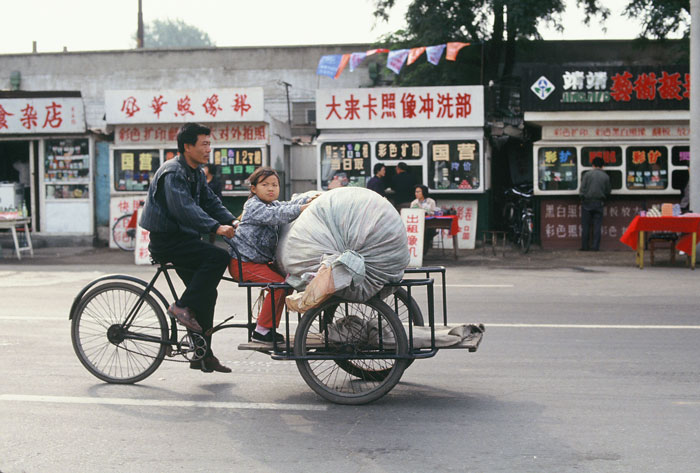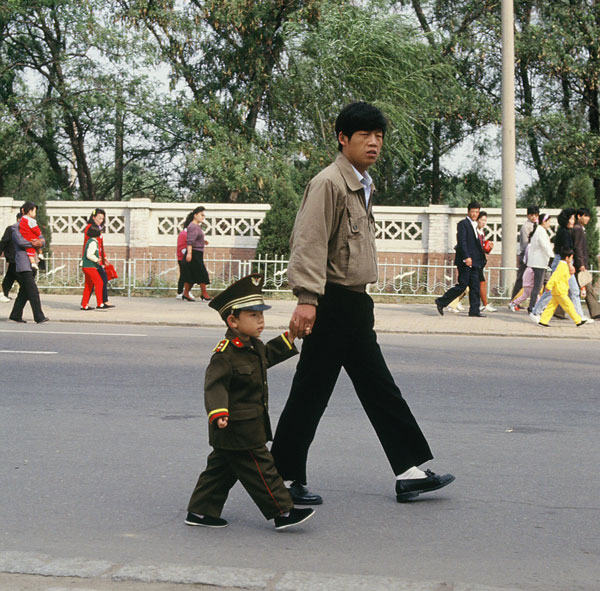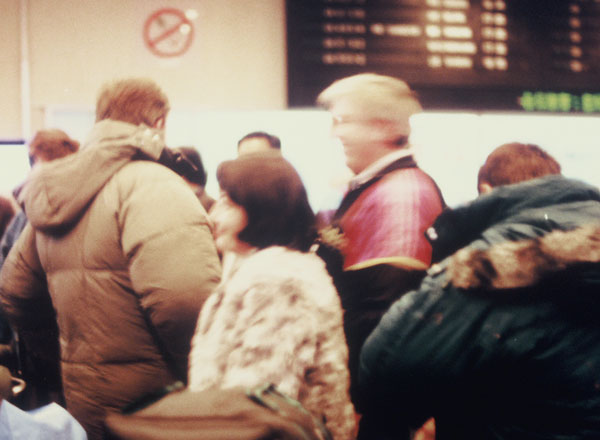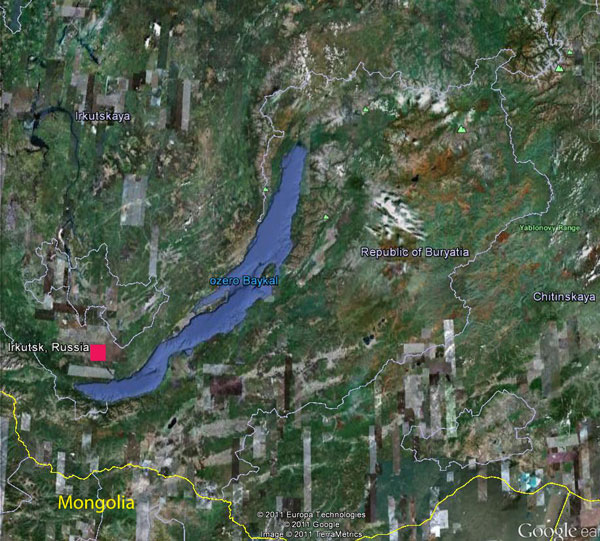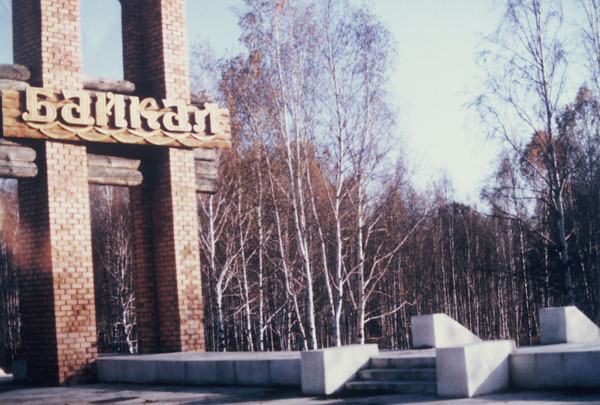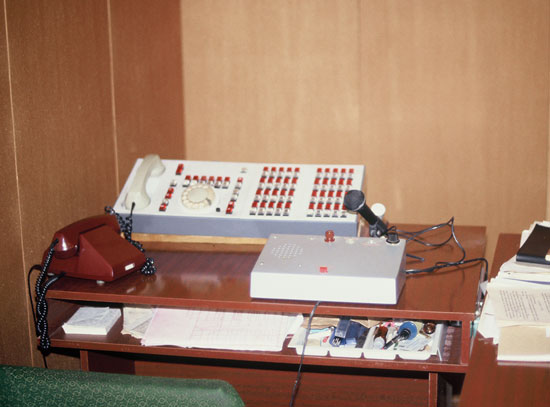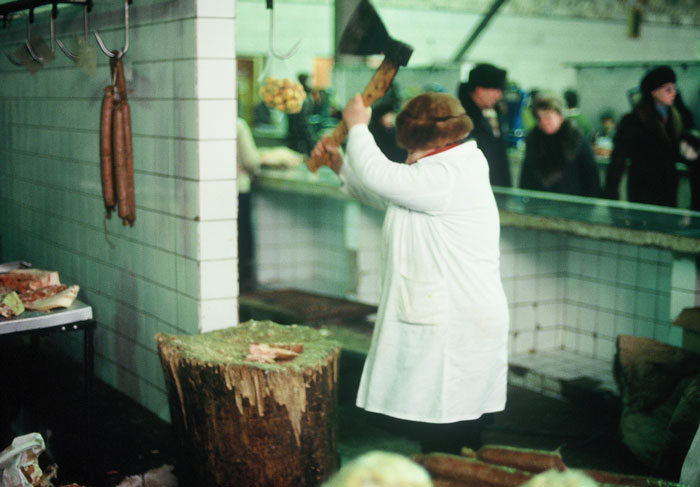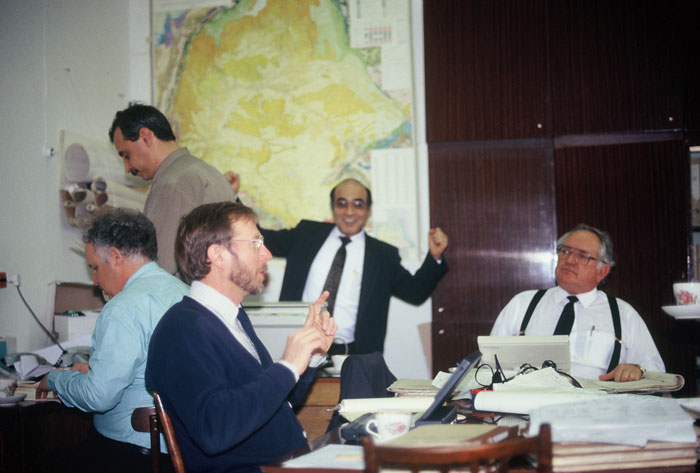|
1979 to 1990 were largely domestic years with the thrill my new growing family; I'll loop back someday and write about this decade. High points during these years include:
In the summer of 1991, I was laid off at NERCO during a reduction-in-force and relocated the family back to Golden. Work was impossible to find in the petroleum industry in the early ‘90’s due to a sharp drop in the price of oil and I had a young hungry family that demanded my income. Over the next three months, more than a hundred resumes and applications were mailed, emailed, and faxed, but no job offers resulted. We were living off my IRA and unemployment but money was running low. In desperation, I applied and was accepted at Colorado School of Mines to earn a Master's degree in Hydrology, figuring it was time for a career change. My stint as an older graduate student had lasted only a couple weeks when a former colleague Jack Krug contacted me and asked if I would join him on a month-long petroleum-consulting trip to Russia in November and December. I looked at my linear algebra textbook and all the young faces in the class, then at the world atlas, and my decision came quickly. Jack and I departed to Hong Kong in mid-November to join the rest of the entourage. The expedition was organized and financed by a Chinese national by the name of Eddie Wong who now carried a US passport. Eddie was in his 60's and had close family ties high in the Chinese communist party. The purpose of the expedition was to formulate joint ventures between China and the new Federation of Russia. The Coup in USSR, or Perestroika, occurred only three months earlier in August, at which time resource joint ventures became available in the Former Soviet Union (FSU) for the first time. Our entourage included Jack (Ph.D. petroleum engineer), me (petroleum geologist), Sam (minerals geologists specializing in gold who joined us from Australia), a German businessman, and Eddie. We spent two nights in Hong Kong making last minute arrangements and enjoying the city. I hadn't been to Hong Kong since my tour in Vietnam in 1967 and 1968. The USS Oriskany docked there twice for R & R to give us a break from the fighting in the Gulf of Tonkin. Fact is, my 21st birthday was in Hong Kong and I spent it with my good friend Pat Murphy who was a classmate of mine from high school. Hong Kong looked very different now and was much more built up than I remembered it from the Vietnam years.
 Map showing Hong Kong, Shenyang, and Dalian, China. We flew from Hong Kong to Shenyang, China, where we were to meet with the China National Petroleum Corporation (CNPC). As the China Airlines plane landed, it was immediately clear we'd left Kansas and were off to a mysterious land of Oz. The plane was surrounded by soldiers with machine guns before the door opened for de-boarding. Jack, Sam, and I stood out like sore thumbs in a sea of Chinese passengers as we went through customs. We had Chinese visas, but they were closely scrutinized. Once through customs, we were received by finely dressed Chinese men and a fancy black limousine, which took us to a classy restaurant to meet clients and CNPC. We were exhausted, but needed to be polite and socialize with the hosts. The meal lasted for hours and we ate exotic Chinese food: some that moved and some that didn't.
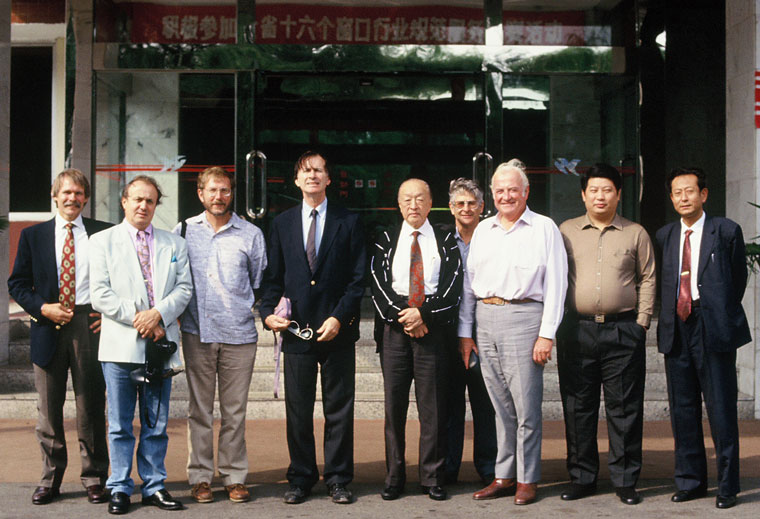
The complete entourage; From the left, Bill Connelly is first, Jack Krug is third, Eddie is fifth, and Sam is seventh.
The next day was taken up with meetings at CNPC's office. Jack, Sam, and I were paraded about as Eddie's 'experts', but discussions were in Chinese, so we just sat there and looked intelligent, and tried to stay awake. The Chinese meetings were in a large room with chairs arranged in a rectangular pattern near the walls with no table in the middle. There were beautiful paintings and mosaics on the walls and lovely tile floors. It was painfully boring for us to sit there for hours while everyone spoke Chinese. For a couple meetings we waited in the lobby with Chin, our interpreter and bodyguard. Chin was a good-looking Chinese fellow about our age with a fascinating life’s story. He was a child rice-farmer during the Cultural Revolution in the 1960's and was not 'chosen' to attend school, rather he was to be a farmer. He somehow managed to find books and self-educated himself enough to gain entrance to college, while all the time rice farming. Rice farming is very hard on people and wears on their feet, legs, and back after years in the wet, and always stooping. During the Cultural Revolution, some 10 million Chinese peasants were killed by Mau Tse Tung's forces, so Chin's survival as an educated rice farmer was quite amazing. His college training focused on dancing and entertaining, but he also learned English (thus his job as a translator). So as we were waiting in the lobby with Chin for the CNPC meeting to finish upstairs, two young boys nearby were playing with a hacky-sack. They were OK, but not good. Chin was paying more and more attention to the boys as time passed, and finally he took off has polished black shoes and borrowed the hacky-sack from the boys, and proceeded to put on a show for us. It was quite a sight and we were pleased and amused. Dressed in his formal black suit here in the lobby of CNPC, it seemed quite out of place to see Chin put on such an accomplished performance with a hacky-sack. It must have had something to do with his dancing background. After a few days in Shenyang, we departed for Irkutsk, Russia, but none of us were prepared for the scene that unfolded at the Shenyang airport. Passengers waiting at the gate for the Aeroflot flight were all rowdy young Russians. They were carrying large red and white nylon bags stuffed with cheap Chinese textiles to take back to Russia and sell on the lucrative ‘black market’ that broke wide open after the Coup. These were the new Russian entrepreneurs and merchants. Each wore several pair of pants and shirts and two parkas, layered over each other. On their arms were several watches with several necklaces around their necks. Since they were limited as to how much luggage they could carry on, they simply wore the rest of the goods. They were an unruly bunch and pushed and shoved and had no concept of waiting in a line. Once in the plane, we were incredibly cramped with all their goods. They smelled bad since they were sweaty from all the cloths they wore.
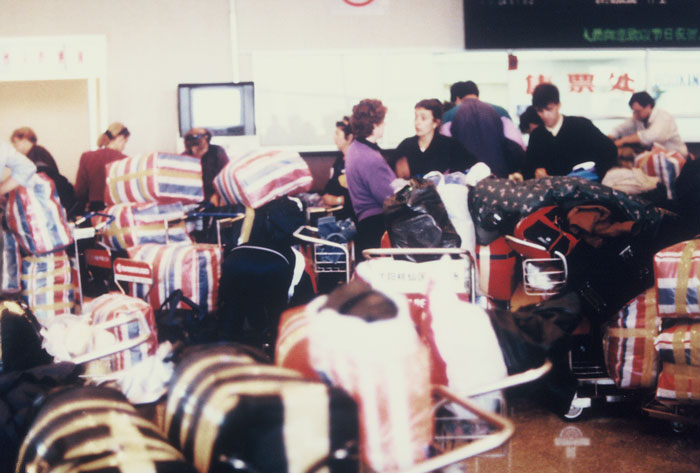
Shenyang airport with Russians and their bags of cheap Chinese textiles to sell on the Russian 'black market' in Irkutsk and places beyond.
Irkutsk is located next to Lake Baikal, the largest fresh water lake in the world. It also is the oldest (30 million years old) and deepest (5387 feet deep), and is said to contain about 20% of the world's fresh water. People in the region believe Baikal water has medicinal qualities, so I drank some just in case. The region is spectacular with evergreen forests and lovely mountains.
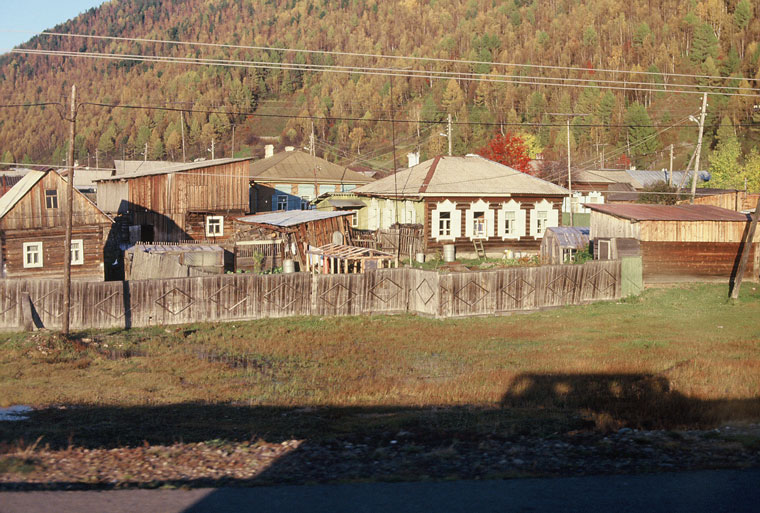
Old log homes in Irkutsk.
Monument on shore of Lake Baikal. Having grown up during the cold war, it was intimidating and enlightening to be in the USSR for the first time and see first-hand what existed behind the iron curtain. It was a very different culture, and seemed old and warn out, and people seemed tired and grumpy. Lights were burnt out and roads were in disrepair. The cars seemed like something from the 1950's and belched smoke as they clanked down the road. We were the first wave of Westerners in the country after the Coup. The air was thick with suspicion, but the KGB was not following us around (not on this trip anyway). Our first official oil and gas meeting in the new Federation of Russia was at Irkutsk Neftegaz where we met with the Deputy General (Neftegaz is Russian for Oil and Gas Department). The Deputy General's office had two sets of padded acoustic doors for security. The office was a long room with a small conference table at one end and his desk next to a window at the other. He clearly was a geologist since there were many nice fossils set about. On his desk were five funky old rotary phones whose cables fed into a single inch-thick loom that ran along the wall. It was obvious these Russians hadn't figured out multiplex phones yet, or there would have been a single phone with five extensions. We sat around the conference table and were offered water, “voda, gaz o sin gaz?” I practiced Russian for several weeks using tapes and was able to memorize a couple hundred words before arriving, and this was easy to understand. 'Carbonated mineral water or plain water?' It was an easy choice since the mineral water was horrid. The Deputy General was quite egotistical and ranted about how great and knowledgeable Russian geologists and geophysicists were and that all they needed from us was our western money. The translator was having trouble keeping up with this motor mouth and I'm certain he only translated the high points. He raved about how he was on the cutting edge of seismic stratigraphy and showed us some paper seismic lines he had handy. There were a couple really cool lines with kimberlite pipes located on the Siberian Shield which he said were diamondiferous. As he rattled on and on, my mind drifted a bit and my eyes wondered about the room. I found myself looking at his desk across the room and saw an old foot-long slide-rule lying on top of his active work papers. When there was a pause in his rant about Russian technological superiority, I quietly stood up and walked to his desk and picked up the slide-rule and politely said, “stoy eta?” (what is this?). He abruptly got up and took it from me and put it into his desk drawer, and said a colleague must have left it in his office. That evening was our first of many dinners with the Russians. I'll surely say this many times before we're finished: Russians love to drink vodka. I don't know how they do it. I don't drink vodka and have been prodded by the best of them to join in the fun. “Chto” they say as they slam down shot after shot of vodka. “Chto” means 100 in Russian and means 100 cubic centimeters, which is a very large shot glass (probably equivalent of two shot glasses). After a while, I learned to fill my glass with water (which looks just like vodka) and slam down drinks alongside the best of them. The only difference was that when morning came and I had due diligence to do, I was fresh and they were hung-over. We spent three days in Irkutsk, then bought Aeroflot tickets to Moscow. The Russian economy was in turmoil and it cost only $20 for the four-hour flight. This was our second Aeroflot flight, but it still came as a shock. There was a dog on a leash with a passenger behind me and a chicken in front, and they fussed at each other for the entire flight. The padding on my seat had long since peeled away and I was sitting on bare metal. There were cigarette butts and bottle caps on the floor that had been there for months and the cabin smelled a bit like a high school football locker room at halftime, except with overtones of barf. There was clanging under the plane that sounded like a loose muffler in my old '49 Plymouth. The convention with Aeroflot is for all the passengers to board first, and boarding is from the rear of the plane. After you've been sitting there for a while, the pilot and copilot board and begin their checkout routine to start the aircraft. I recall once after they boarded and couldn't find the keys and we waited an hour while they left to find them. The opposite is true when you land. The pilot de-boards first, again through the rear of the plane while the passengers sit and wait. Moscow was gray and depressing, from the airport lobby where half the lights were burnt out, to the weather, to the uncertain faces of the people hustling about looking for food and other commodities. Inflation was eating away at what limited savings people might have, and the mafia was growing stronger. A housewife might spend half her day waiting in lines to buy enough food to feed her family dinner. It was depressing and it was not safe. We kept a low profile by keeping our mouths shut and not wearing jewelry or designer clothes. We only stayed in Moscow three nights while Eddie was joined by a Chinese colleague who would remain with us for the rest of the trip. He arrived with a case of dried noodles and this was to be his diet for the next three weeks. The first place we toured in Moscow was Red Square and Saint Basil's Cathedral where I hope everyone has opportunity to visit sometime in their life. We were there so soon after the Coup we could see scratches on the paving stones from when the tanks rolled through back in August and Yeltsin stood on one and proclaimed, “I am in charge”; when Grobachev could not be located. The only other sightseeing we did was to go to the ‘black market’ at Arbat Street. This was glorified flee market, Russian style, that had just about everything for sale you could imagine, legal and otherwise. I was fascinated by the World War II Nazi memorabilia such as Iron Crosses, huge swastika banners and flags, helmets, lugers, and more. I was so overwhelmed that in the end, I came away with nothing. After Moscow, we spent a week in Ukhta near the Arctic Circle in northern Russia where winter had set in and conditions were icy and cold. Driving around in the old Russian cars there was dangerous for a number of reason, not the least of which was excessive drinking. It remains a mystery to me why Russians resisted turning on their headlights even in the darkest conditions, but it made for dangerous driving. Perhaps it was difficult to replace light bulbs when they burnt out. Our driver was very aggressive and drove much too fast and broke all laws and rules of common decency. Jack fussed about the speed I drove Stateside, and he was having a real fit here. He quickly learned the word ‘medleani’ (which means ‘slow’) and delivered it repeatedly and with gusto to the driver.
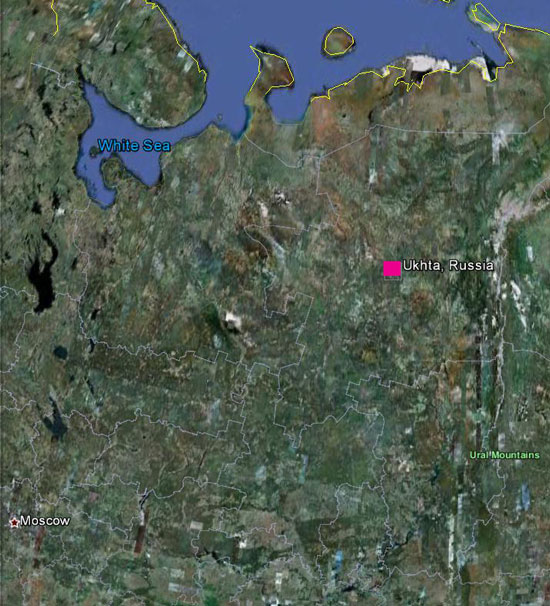 Map of Moscow and Ukhta region of Russia. We were in Ukhta to review data about the fractured Devonian carbonates of the Tehman-Pechora basin in hopes of putting together a joint venture. We spent several days in a conference room pouring through data with a Russian geologist and engineer and our translator. These sessions were long and intense, and were followed by long dinners with too much vodka. My counterpart was a handsome white Russian about my age whom we nicknamed “Conan” after Conan-the-Great. He was a large muscular man with blond hair and a handsome carved face. He had a serious expression most of the time and only rarely smiled. When our meetings ended, I found myself alone with Conan in the conference room for half an hour with nothing important to do. The silence was awkward, then Conan managed a few broken words of English. He looked me in the eyes and said in a deep throaty voice, “Last year we war. Fuck you America”, as he flipped me the finger. “But now it's OK”. That was it, and he gave me a big smile. I suppose he summed up the situation in those few words better than anyone else had managed thus far during the expedition. My last memory of Ukhta was the cockroaches. Never had I seen so many cockroaches. Jack could be heard in the apartment next door late into the night banging against the wall as he killed them and counted, “... 99, 100, 101 ....” After Ukhta, we flew back to Moscow for a few days, then to Surgut (Siberia), then to Irkutsk for a few more days. From Irkutsk, we flew to Dalian China (on the Yellow Sea) to again meet with CNPC. During this visit, we got to tour the countryside and visit drilling rigs which were in a farming region. I took many pictures and one of my photos of a Chinese drilling operation was used for the cover of the Oil & Gas Journal a couple years later when interest in Chinese joint ventures peaked. We flew back to the States via Hong Kong and it was a breath of fresh air to leave Russia and China and get back to the 'free world' after a month in these foreign lands.
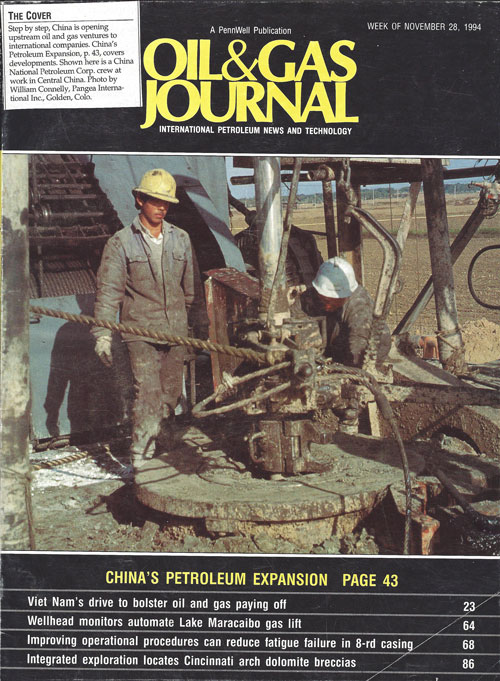 As it turned out, Eddie stiffed us and we never were paid for our consulting time on this trip. He paid the airfares and expenses, and made all of the introductions and obtained the Visas, so his costs were considerable. But my bill alone was more than $15,000 which I desperately needed. However I gained valuable experience traveling in Russia and working with Russian petroleum data the Cyrillic alphabet and felt I was on my way to having my 'card punched' for more consulting in Russia. I knew enough Russian that I could sort through their data and travel, and estimate metric tons of reserves in Russian oil fields. We brought back a wealth of data which we continued to study. Many companies desired to do business in the FSU, but nobody had expertise in the region and nobody had actually been on the ground and understood how it was organized. Jack and I had something unique to offer and we were hungry. Questa Engineering gave me several small domestic jobs in the weeks that followed so I could support my family as we bided our time for the next Russian expedition. We continued to research the Western Siberia Basin in our spare time, and I continued to listen to Russian language tapes to strengthen my skills.
1992 New Year's Day passed and we still hadn't received payment for our first trip to Russia. I was doing some odd jobs for Questa, but the household finances were quite strained and I was in desperate need of a ‘real job’ with insurance and dependable income. Job applications and resumes were mailed daily, but times were difficult the oil industry. Finally Questa got a good lead for another trip to Russia and needed a geologist. I was one of the few that had actually been to Russia and knew a bit about the data and logistics, so I was the obvious choice. An Israeli client needed a petroleum consulting company to travel with them to Tomsk in the Western Siberia Basin to gather and review data for the purpose of completing a Feasibility Study and Resource Assessment of three oil fields located in Tomsk Oblast. Krapivinskoye, Karaiskoye, and Fedyushkinskoye fields were discovered and delineated in the 1980's, but due to their remote location, had not been developed or produced. The client wanted to evaluate the economics of a joint venture with the Russians to develop and produce the fields. However they needed an independent appraisal of the oil reserves rather than depending on the Russian numbers. Jack and I were very hungry and available, and all but begged for the project. It materialized quickly and Jack asked Doug Patten, a petroleum engineer, to join us. We expedited obtaining our Russian Visas and departed for Moscow and Tomsk on January 21st. Most of the paragraphs below are my journal entries from the trip. Many entries were written as letters, but none were sent since there was no Internet yet and email at such remote locations was extremely difficult. On subsequent trips to Russia and Kazakhstan, I used an acoustic coupler rather than a wire to connect my computer to the phone line. I used DunsMail as a dial-up email carrier, but it was painful and the baud rate sometimes was as slow as 150 baud/second due to the large amount of static noise on the telephone lines. There never were local dial-up numbers, so I had to call Moscow or Almaty for a connection.
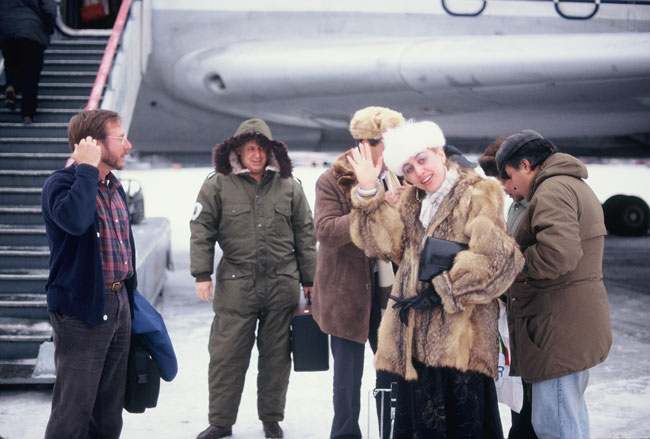 Arriving in Tomsk on Aeroflot, the first 2 on the left are Jack Krug and Heim Fligelman.
January 23, 1992
January 24, 1992
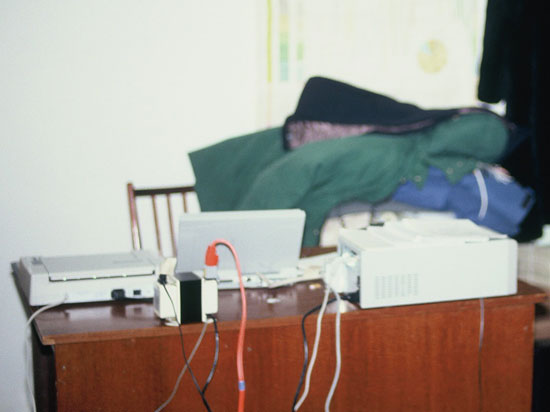 My scanner, notebook computer, power supply, and tape backup.
Dinner tonight just ended and it was quite the experience. The Israelis wining and dining the Russians, with Jack and I being the targets of the American jokes. The Israelis love to drink and sing and Jack and I had a great time watching the show. After a seemingly endless stream of toasts, the hard core drinkers got drunk and everyone else cheered them on as they led songs. My hand is very sore today and I am not sure why. Perhaps I injured it last night when I pulled the ring off my right hand because my finger was swelling. It's sore near the base of the palm and makes it impossible to carry things or shake hands. Sure hope it gets better soon.
January 25, 1992
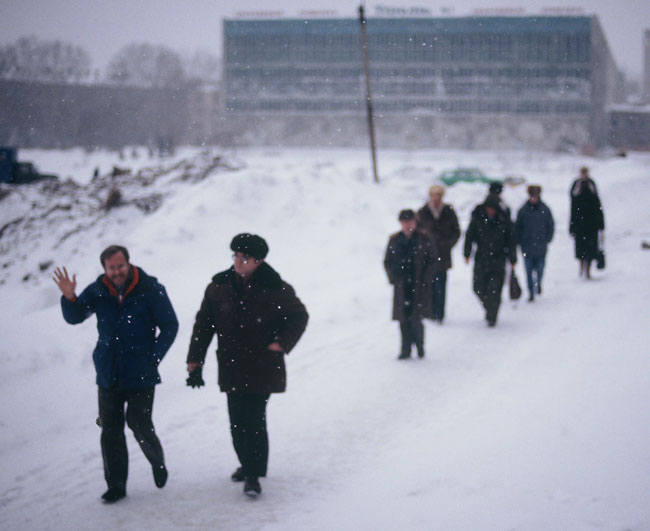 Walking to work, Jack Krug and Doug Patton in front. The Geological Institute was not open today, so there was little we could do in the way of work. In a few minutes we're going to the marketplace to shop for souvenirs. I've found where to buy shabkas and am looking forward to buying one for everyone in the family. Most are traded in the ‘black market’ and cost 4000 to 5000 rubles. With the current black market exchange rate of 150:1, it will cost about $30 for a nice fox shabka. Keep in mind that a professional is earning the equivalent of $50/month (and often are being paid a month or two late), so by local standards shabkas are very expensive. Just returned from a full afternoon of “magizine”, or shopping. I found a lovely red fox shabka in the “department store” and bought it for Bernadine; it cost 5000 rubles, or $33. It's the epitome of the huge fur hats and I hope she likes it. If I can find a less expensive one for myself in the black market tomorrow, I will buy it. I also bought three birch bark canisters, a painted wooden spoon, and a lovely painted egg, all of which are souvenirs characteristic of Siberia. [The canisters and egg are in my bookshelf, and the spoons are hanging in the kitchen.] The stores are surprisingly empty and most goods are of poor quality. The Israelis are a most interesting group of people. They all bought new cloths for this trip to Siberia since it never gets cold in Israel. Needless to say, they all stand out like sore thumbs in their new brightly colored overstuffed parkas as we browse through shops. Heim Fligelman wore army brown Arctic coveralls with a military badge on the sleeve. I'm convinced the Siberians thought he just dropped out of the sky. His balding and poorly groomed gray hair adds to his color. Shuba Folkman spent his day shopping for new cloths since his baggage was lost in transit and he is tired of wearing the same soiled cloths. Bariudin Victoz is an interesting Israeli since he is the only one that emigrated from Russia. He speaks fluent Russian and Hebrew, plus fair English. The Israelis often sail off into their Hebrew when they have things sensitive to say and when they get lazy.
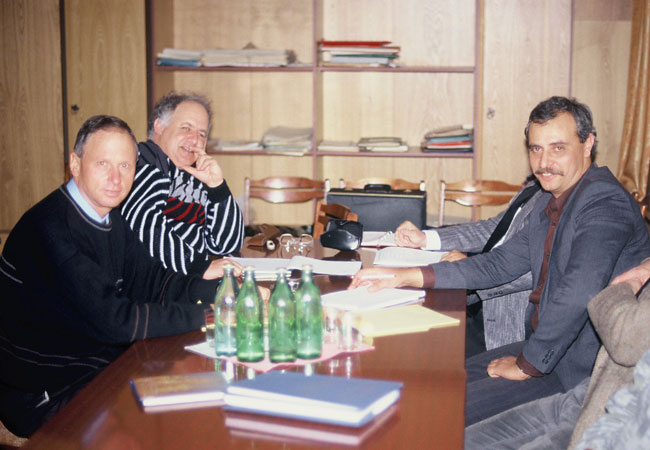 Some of the Israelis meeting; Heim Fligelman is second to left. Our review and copying of data is not going well. The Russians will not allow us to copy anything and insist we spend our time here during the Feasibility Study rather than copying the data and doing the study in the States. It's very awkward to be here with this large group and not be doing what we came here to do. Urie told me last night to prioritized and scan everything I could and for us to operate in a “military fashion” in our quest for data. He's the top-dog in this project and a former military officer, so he has a commanding presence. The Russians have not yet figured out the scanner and we hope to be able to copy much more of the data before they shut us down. Urie told me to do anything necessary to get the data: I suppose they would bail me out of jail if things go sour. Tomorrow is Sunday and it appears we'll not be able to work. I hope Urie doesn't shut things down and send us home too soon since I really need the work. Jack is of the same thinking and is exploring ways to extend the job. He suggested to Urie that Jack and I stay and do much of the geological and engineering review here in Tomsk, and finish the report later in Golden. We have worked five billable days since departing on Tuesday 1/21/92. It's unlikely we would leave for home before Tuesday 1/28/92; it would take three days to get home. Thus the least number of days I expect from this job is 11. At $500/day (guaranteed from Questa), I would make $5500. If we don't get enough data to complete a Feasibility Study, this trip would not provide acceptable economics to me.
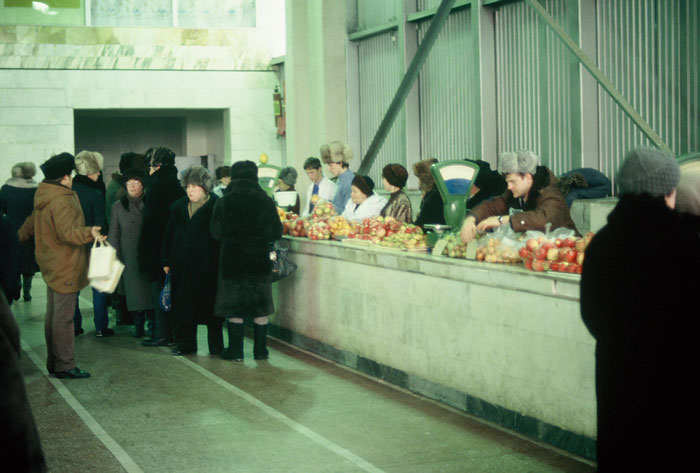
Indoor (but cold) food market in Tomsk.
January 26, 1992
The accommodations in Tomsk are good. This five-story hotel used to be owned by the Communist Party and is in excellent repair. There are about 16 rooms per floor and each pair of rooms share a bathroom. The format is interesting: there is one locked door into each pair of rooms, then a shower/tub/sink in a room on the right and a toilet/sink in a room on the left. Each bedroom then is accessed through its own locked door. The rooms themselves have a very small single bed, nice hardwood floor, nice but inexpensive furniture, and a low quality Russian TV and radio (with no English speaking stations). The view is out over the Tom River and endless flat lands in a white deep-freeze. I'll go for a walk latter this morning. The temperature generally is about -10 to -20 degrees Centigrade, so one needs to dress warm. This morning I'll wear my long-johns, heavy down coat with a hood, Sorrel boots, and gloves. I doubt much will be going on so early this Sunday morning, but you never know. Perhaps I'll walk out to the river and see if the fishermen are there yet. Needless to say, it will be dark until about 9AM.
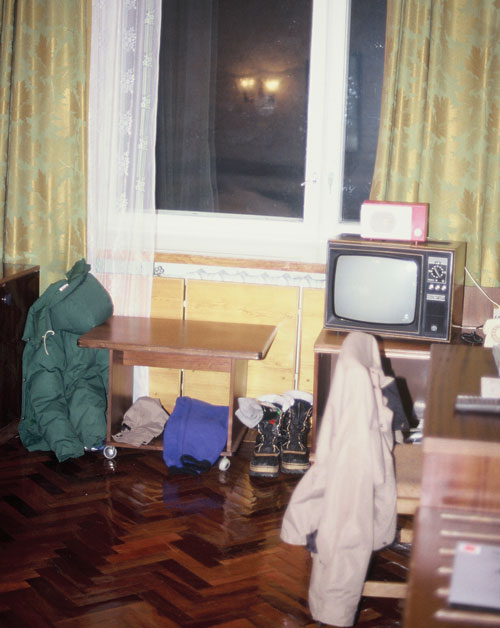 It's nearly midnight now and I am going to bed. I walked to the fishing hole and saw how the Russians drill a five-inch hole through the 6-inches of ice to fish. I watched for 20 minutes in the predawn dark, but no one caught any fish. I don't know why the river doesn't freeze where it passes Tomsk because it's frozen a mile upriver. We walked through the ‘black market’ this morning and think ‘black market’ is not the correct word for it. It's like the Saturday Market in Portland, or like thousands of swap meets across the country. Nothing more here than normal individual free enterprise. Small booths are set up in the snow and small-time vendors are selling their meager goods. Many vendors worked from their cars with the engines running.
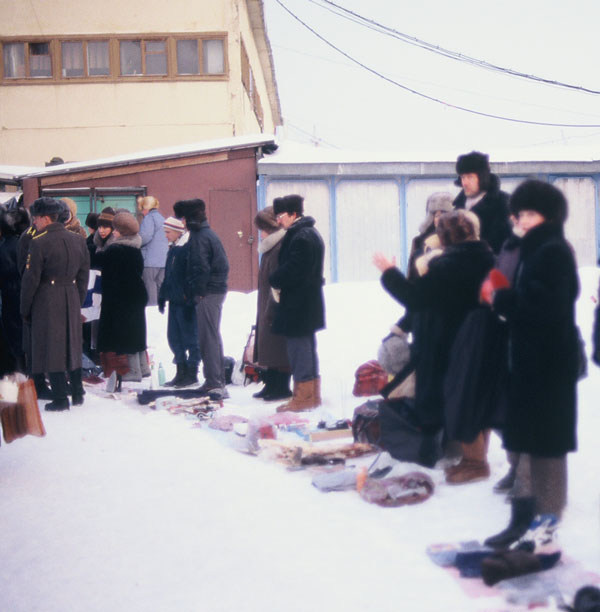 "Black Market" in Tomsk with vendors selling their meager goods. We had a tour to the forest today in our minibus. The drive from Tomsk took about one hour and was interesting. The countryside is in a deep freeze, but people go about their business. Bus stops are located everywhere and people stand waiting for busses in the bitter cold. Their cloths are adequate and everyone wears shabkas. A lot of lumber is sold from the Tomsk region. Tonight we went to the Fantasia Restaurant for dinner. It's located near the Ministry of Geology along the Tom River. The food was alright and there was live entertainment. The Israelis sang and drank and had a merry time. The Russian girls ask us to dance and seemed to think our group was a novelty. I'm tired now and will go to bed so that I'll be fresh tomorrow. I hope we're able to obtain data tomorrow so that this trip does not come to a premature end.
January 28, 1992
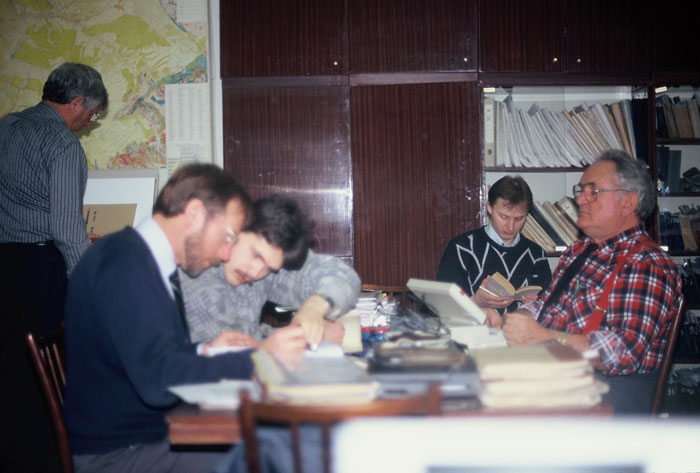
Last night Jack and I fired up the sauna here in the hotel. It's located in the basement and is quite nice. There's a dry sauna, a large tiled cool water pool, showers, poolroom with chess and a fireplace, and a sitting room. We stayed there for nearly two hours last night and will make it part of our routine until we leave. We have no idea when we will leave yet. Urie is fussing with the Russians about them not allowing us to copy data. Perhaps “fusing” is an understatement: there have been full-on shouting matches and some hard language.
January 30, 1992
Then there's the continuing story about the wooden egg I purchased a few days ago. We went to several shops on Saturday the 25th to buy souvenirs. I bought this three-inch-high hand-painted wooden egg for five dollars and didn't think much more about it. That is until two young ladies greeted us two days later at our hotel informing us that the egg should have sold for $65 [all prices were actually in rubles]. This is a huge amount of money for the sales girl and she was prepared to buy the egg back and give me a nice matruska for my inconvenience. At first this seemed like the right thing to do, but as I thought about it and looked at the pretty hand-painted wooden egg (now with a story), I elected to pay the $60 and keep it. I handed her three crispy twenty-dollar bills which shocked the Russians because it's such an extravagance. Greenbacks are rare here, and for me flash them around for a wooden egg.... Now every day I take a ration from my associates about the “wooden egg”. I tell them it's the “Golden Egg of Tomsk”. Victor especially likes to rib me about the egg, and I love to play off the ribbing.
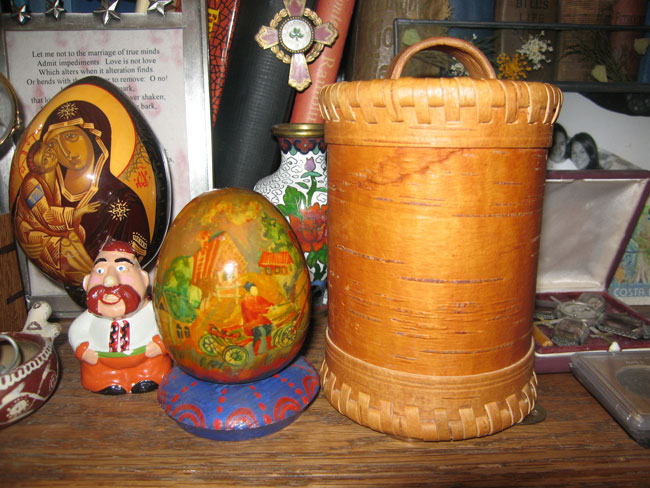 The golden colored wooden egg from Tomsk with the birch bark canister on my bookshelf. We just returned from an evening sauna with four Russian hosts, all of whom are medical doctors. It was quite a nice facility across the street from the Tomsk Hospital. The Russians picked us up at the hotel in their old jeep ambulance, and brought salmon, salmon eggs, beer, cognac, and tea. They said the sauna was 120 degrees Fahrenheit, far hotter than I ever have been. I was very difficult to stay in for more than five minutes at a time. There was a three-meter-deep pool tiled with granite to jump in to cool off. Jack and I had an enjoyable evening socializing with the Russian hosts. They told how difficult it is in the medical profession in Russia due to a lack of supplies. One doctor is convinced Russia will have another revolution in about six months resulting from discontent for the lack of consumer goods and food. On Sunday night, we ate at the Fantasia Restaurant again. We were told not many people can afford to eat there because it costs three-days’ wages for a meal. We dined as a group of 10 and our total bill (including vodka and cognac) was less than $30. Our room is the nicest in the city and is quite adequate, and it cost $2.50 per night. There was a live band and dancing at Fantasia and we had a wonderful time. The Russian girls are quite aggressive and asked us to dance many times, but Jack and I declined. It's common for the Russian girls to dance with other girls, and sometimes the men dance with men.
January 31, 1992
The next exercise was to pick porosity off the acoustic log. We observed 260 ms/meter travel time through the reservoir interval and wanted to convert it to porosity. You wouldn't believe the makeshift equation they gave us for this calculation! It was full of functions for SP and clean-sand factors and more. After an hour of trying to input all these variables, I calculated 805% porosity! By now the Russians were quite frustrated and eluded to a computer program they would bring tomorrow. We went ahead and used the observed 260 travel time measurement and calculated 19% porosity a with conventional equation, which was a very reasonable answer. Finally, I asked to review the mapped oil/water contact. In the example well I selected, the oil/water contact appeared to be at -2615 meters based on a sudden decrease in resistivity at that depth. They said it actually was deeper because they tested the well and recovered oil with no water in the low resistivity interval. I took their mapped oil/water contact of -2605 and projected it into the example well and it projected eight meters above my estimated contact, not below as they had suggested. The Russians now were getting very testy with me. The issue never was resolved, but it appears my contact was approximately correct and they were blowing smoke.
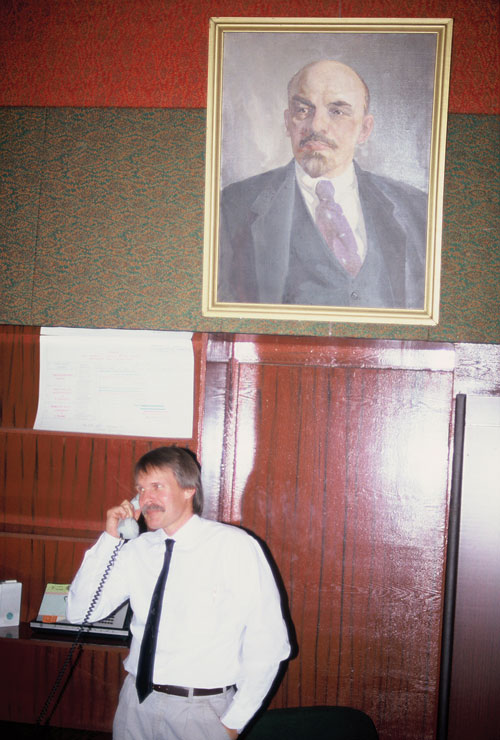 Bill Connelly on official business call with Lenin painting on wall.
February 2, 1992
Our Visas were extended until today, but we will not leave the country until tomorrow after spending the night in Moscow. So here we are carrying contraband data out of the country with expired Visas! I also have some old Russian coins, four fox shabkas for the girls, two small Russian Orthodox icons, and a wooden egg. I exchanged addresses with the Drilling Manager's daughter so that she can write Sage as a pin pal. She's 13 years old and is bright and cute. She speaks fair English, much better than her father. She has been playing piano for six years and attends a music school in addition to regular school. It would be wonderful if someday she could visit us in Golden.
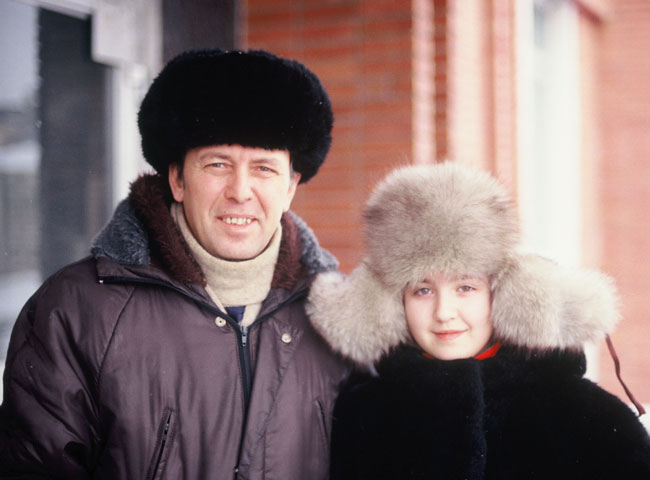 Drilling engineer and his 13 year-old daughter.
February 3, 1992
Postscript: Back in Golden, the Israelis approved Questa to prepare a Feasibility Study of the Krapivinskoye, Karaiskoye, and Fedyushkinskoye fields. This project kept us busy until May when they pulled the plug and asked us to send them a preliminary report of whatever we had completed to date and cut expenses on the job. At the same time (as luck would have it) Hilga, a manager from Norsk Hydro and minority participant in the Tomsk project, needed a geologist to go to their office in Oslo Norway immediately to join a team evaluating the White Knights project in Raduzhney Siberia. He liked my work and asked if I was available for a couple months. I negotiated at 75:25 fee sharing arrangement with Questa and committed to the job. How sweet to know where your next check is coming from, and this time for a major oil company who's known for paying promptly. Go to Chapters 9 & 10 |
